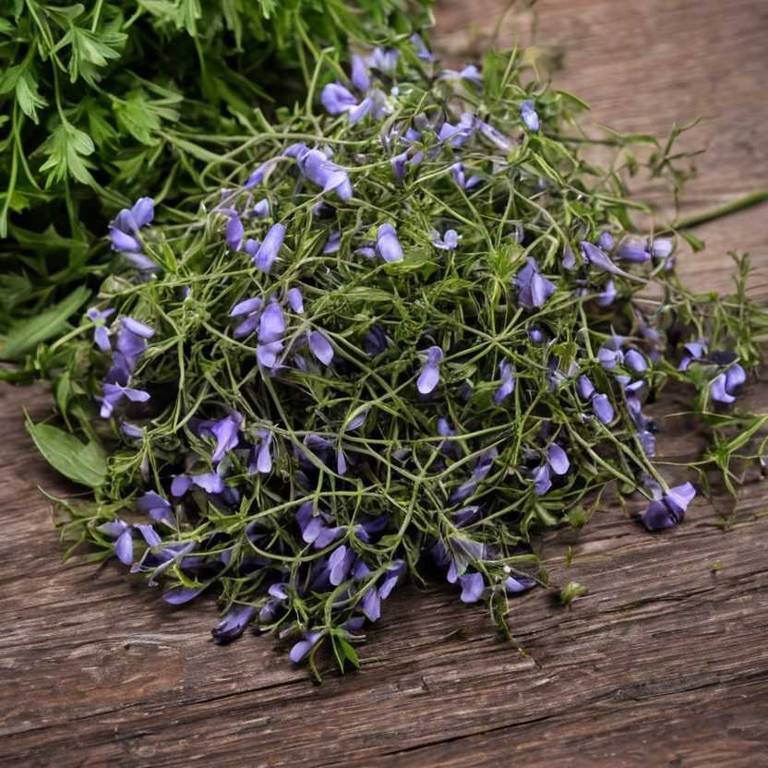Corylifolia Psoralea (Psoralea corylifolia)
Corylifolia Psoralea (Psoralea corylifolia) is a member of the Fabaceae family, native to Southern Asia, East Asia, and Southwest China. Traditionally, its seeds, leaves, and roots have been used for decoctions, powders, and infusions.
This herb is particularly valued for its tonic, anti-inflammatory, and diuretic actions, and has a long history of use in ayurvedic medicine, traditional chinese medicine, and korean traditional medicine.

Quick Facts / Key Information
| Common Name | Corylifolia Psoralea |
|---|---|
| Scientific Name | Psoralea corylifolia |
| Plant Family | Fabaceae |
| Genus | Psoralea |
| Species | corylifolia |
| Native Range | Southern Asia, East Asia, Southwest China |
| Plant Parts Used | Seeds, Leaves, Roots |
| Primary Medicinal Actions | Tonic, Anti-Inflammatory, Diuretic |
| Primary Traditional Systems | Ayurvedic Medicine, Traditional Chinese Medicine, Korean Traditional Medicine |
| Historical Preparation Methods | Decoction, Powder, Infusion |
Botanical Identity
- Scientific Name
- Psoralea corylifolia
- Common Name
- Corylifolia Psoralea
- Synonyms / Alternative Names
- Babchi, Babool, Indian Acacia
- Plant Family
- Fabaceae
- Genus
- Psoralea
Botanical Description
- Growth Habit
- Perennial herbaceous plant.
- Height
- It typically grows to a height of 1 to 2 meters.
- Leaves
- Stipitate, pinnately compound leaves with dark green upper surface and lighter green lower surface, bearing prominent stomatal bands along the abaxial midrib.
- Flowers
- Inflorescence consisting of solitary, axillary flower clusters with actinomorphic flowers having five white petals and five yellow stamens, each with two anthers, and a superior ovary with two styles.
- Stems
- Woody, erect, simple branching, glabrous surface, opposite leaf arrangement, stipitate nodes.
Traditional Uses / Historical Use
Traditional Systems
- Ayurvedic Medicine
- Traditional Chinese Medicine
Historical Preparation Methods
- Decoction
- Powder
- Infusion
- Poultice
Medicinal Actions
- Tonic
- As described in traditional systems, a moderate tonic, for broad-use formulations.
- Anti-inflammatory
- Commonly referenced as a mild anti-inflammatory, for general calming applications.
- Diuretic
- Traditionally described as a soothing diuretic, in fluid-regulation contexts.
- Carminative
- In herbal texts, considered a warming carminative, in relation to gastrointestinal comfort.
Active Compounds
- Flavonoid
- Naturally occurring polyphenols that contribute to pigmentation and structural chemistry.
- Coumarin
- Plant-derived compounds often associated with fragrance-related chemistry.
- Tannin
- A group of compounds frequently present in plant tissues exposed to herbivory.
- Phenolic Acid
- A group of plant-derived compounds frequently identified in herbal material.
Modern Research Overview
This section is reserved for future summaries of scientific research related to this plant. As additional verified sources are reviewed, relevant study information will be added here.
Safety & Contraindications
- General Precautions
- Caution is advised in certain contexts based on traditional use and available information.
- Contraindications
- Available information does not clearly establish contraindications for the use of this herb.
- Allergies
- Allergic reactions associated with this herb have not been well documented.
- Drug Interactions
- There is insufficient evidence to determine whether this herb interacts with pharmaceutical drugs.
- Toxicity
- Reports of toxicity related to this herb are not well documented in available literature.
- Pregnancy & Breastfeeding
- Information addressing pregnancy and breastfeeding-related safety for this herb is limited.
Preparation & Usage Methods
- Infusion
- Water is poured over plant material and allowed to steep before straining.
- Decoction
- A preparation method involving prolonged boiling of roots, bark, or dense plant material.
- Poultice
- Plant parts are crushed or moistened and placed directly on the body.
- Powder
- Powdered preparations use finely milled plant parts.
- Tincture
- Alcohol is used as a solvent to extract plant constituents over time.
Growing, Harvesting & Storage
Growing / Cultivation
- Soil
- Prefers loamy soil with well-drained conditions. Typically grows best in organically rich soils.
- Sunlight
- Thrives in partial sun. Tolerates full sun to partial shade.
- Watering
- Prefers well-balanced moisture levels. Tolerates variable moisture levels.
Medical Disclaimer
The information provided on this page is for educational and informational purposes only. It is not intended to diagnose, treat, cure, or prevent any medical condition. Always consult a qualified healthcare professional before using any herb for medicinal purposes.